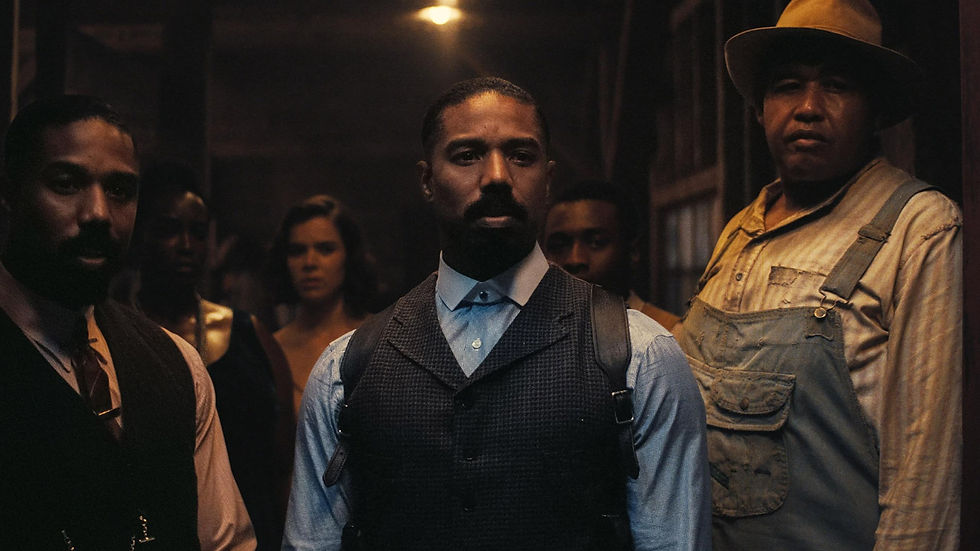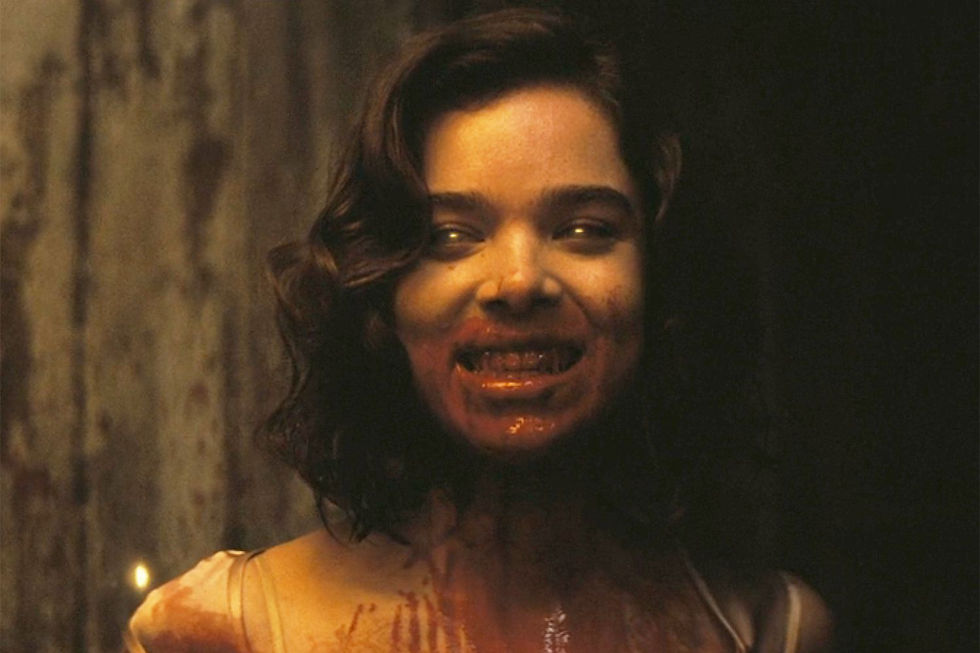"Sinners" is a unique and engaging horror
- Max Jasper

- Apr 22, 2025
- 5 min read
Updated: Jul 21, 2025
For a vampiric being to enter any owned property, whether it belongs to humans, witches, werewolves, or doppelgängers, they must first be invited. – Vampire Diaries Wiki
I'm somewhat indifferent to the classic horror monster that is the vampire. Back in elementary school, some of my classmates were really into vampires--not in a full-on "South Park vamp kid" way, but enough to bring them up constantly, especially as Halloween rolled around. I thought vampires had unique aspects, but I never quite understood the hype. Perhaps that was due to my lack of vampire knowledge then (and now), or perhaps it was because, at their core, vampires are a bit dull. Sure, they have cool-looking fangs, can suck blood, transform into bats, and are allergic to garlic, yet I found those characteristics made vampires one of the more mundane horror creatures out there.
The vampires in Ryan Coogler's 2025 horror/adventure Sinners share those characteristics but don't present themselves as entities of gothic evil. While they are certainly the antagonists of the film, the lead vampire, Remmick (Jack O'Connell), is quite endearing when compared to Count Olrok or Dracula. Remmick is a friendly vampire, only wanting to transform the humans of Clarksdale, Mississippi to give them the gift of "eternal life." Yet, Remmick faces a major obstacle: a party at Club Juke, a newly established juke joint founded by identical twin brothers Smoke and Stack (Michael B. Jordan). The club caters to the Black community in Clarksdale--except for Mary (Hailee Steinfeld), Stack's former flame.

What sets this film apart is the characters’ unease over Remmick’s possible ties to the Ku Klux Klan. The underlying tension of racism, intertwined with the looming horror of a vampire, adds a chilling layer to the film, heightening its suspense. Remmick, of course, is unable to enter Club Juke without a verbal invitation. He stays outside, yet his presence piques the interest of Stack, the unguarded brother, who tells Mary to go and interrogate Remmick to see if he's truly a good guy. Unfortunately for Stack, this is one of the biggest mistakes (or, shall we say "sins") of the main characters, as Mary is transformed into a vampire off-screen and gets mistakenly invited inside. She wreaks havoc, transforming Stack into a vampire, along with a few other patrons.
During this time, the film primarily follows musical prodigy Sammie "Preacher Boy" Moore (Miles Canton) as he shares his gift for blues music at Club Juke, all while trying to win over Pearline (Jayme Lawson). As the story unfolds, it’s revealed that Sammie is the vampires’ top target--they seek to transform him, harnessing his soulful sound to lure new recruits into their grasp.

Music plays a vital role in the film, serving as both a representation of Clarksdale’s vibrant community and a powerful reflection of its stark racial divide. Music ends up being the greatest weapon in the film, exemplified by Sammie's guitar, which becomes the key to stopping the vampires’ reign once and for all.
My favorite scene in the film is its powerful ending, where an elderly Sammie plays electric blues in a club aptly named Pearline's. As Stack and Mary step inside, they offer Sammie a choice: embrace immortality or let his life run its natural course. He refuses, but confesses that the unforgettable night at Club Juke was the "best day of my life." In a quiet moment of understanding, Stack and Mary agree before walking away, leaving Sammie alone in the dimly lit nightclub.
This ending is deeply impactful, revealing that the true villains of the story were never the vampires--it was the Ku Klux Klan. While the Klan plays a relatively minor role in the larger narrative, their aim is clear: the eradication of Black lives. In contrast, the vampires seek unity, transcending race and division. This is why Stack and Mary give Sammie the choice--they recognize the struggles he's endured, leaving him to decide whether to remain in a fractured world or step into one where differences dissolve.
Despite its powerful ending, I did have a few critiques of Sinners.
First, the title. My friend John told me he had participated in a Warner Brothers survey a few months prior to help determine the film’s name. The studio was torn between Sinners and Damned, with the former ultimately winning. However, neither title quite captures the essence of the story. A more fitting name, in my opinion, would have been Club Juke, given that the club serves as a major obstacle for the vampires and its music is so electrifying that it awakens musicians from both the past and future.
Additionally, when Smoke annihilates the Ku Klux Klan members outside the club, he does so with such fierce passion, clutching onto that night as if it were the most significant moment of his life.

Another issue I had was the pacing. The first act moves slowly, dedicated almost entirely to character introductions. While these moments are valuable—especially since many characters ultimately share the same fate--the buildup lingers longer than necessary.
The second act, however, is where the film truly shines. Club Juke’s introduction breathes life into the narrative, making the venue feel like an unstoppable force of its own—a character in its own right.
That illusion of invincibility shatters when Grace Chow (Li Jun Li) foolishly allows the vampires inside, setting off a thrilling climax. Grace's decision is infuriating, but it leads to such a gripping sequence that I can’t complain--well, except for one thing.
During the climax, I found myself battling a different horror: the two women seated next to me. Their constant chatter made it feel like I was stuck in a sports bar rather than an early screening of a highly anticipated film. I pride myself on watching movies with my full attention, allowing the story to unfold as intended. But their running commentary made it difficult to stay immersed. To make matters worse, they had their phones out, too--a blatant disregard for basic theater etiquette. How they managed to score tickets to an early screening with such obnoxious behavior is beyond me.

My frustrating theater experience aside, Ryan Coogler’s Sinners is a standout film. With its stellar performances, striking cinematography, and impeccable set design, I wouldn’t be surprised if it recoups its budget within weeks. While some pacing choices felt unusual, the film remains a bold and engaging horror piece; one that I could easily see earning a few Academy Award nominations.
All things considered, I’d rate Sinners a solid four out of five stars.
Thank you to WB and StudioU for hooking my brother and me up with free tickets to this early screening! Always love these early screenings!


Comments